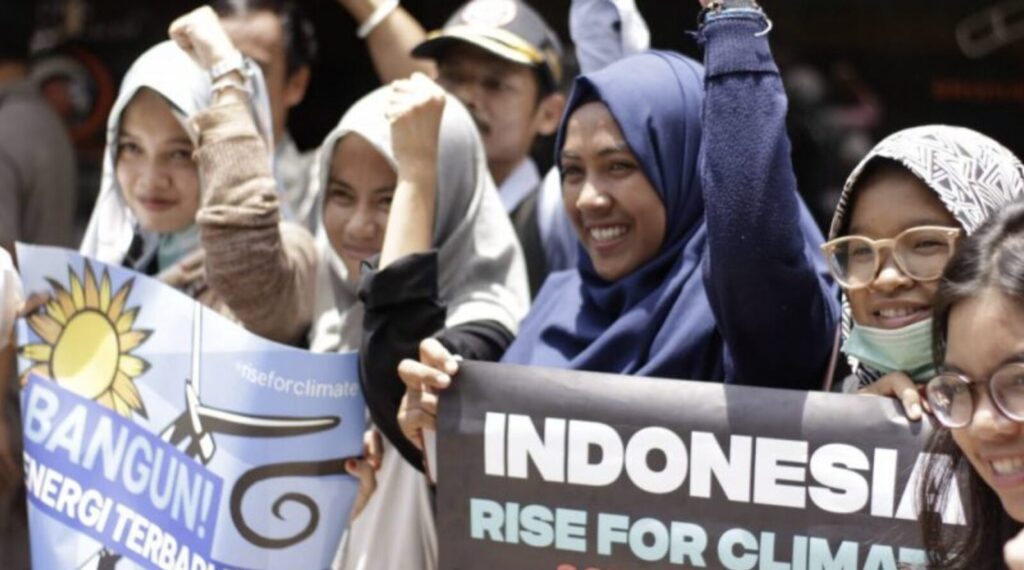Opinion: You Are Not Alone

Indonesian climate activists. Photo: 350.org.
Love, Justice and Climate Change

It is easy to feel overwhelmed and alone in the face of the climate crisis. I know I struggle with those feelings all too often. However, I’m sure we are less alone with this crisis than we think. Reality is different from what our feelings often tell us. There are huge numbers of people with us in this struggle. Below I will share with you some newly reported information about how widespread support for climate action is throughout the world.
However, in order to let this information deeply inform our perspective, I think there are two other essential issues to consider. The first is that we live in a society that emphasizes individualism. Being self-reliant and able to handle things on our own is highly valued. But knowing that we need other people and prioritizing being part of a group tends to be less admired.
Capitalism
Capitalism is built on our being individualistic and having weak group orientations. Wealthy elites and right wingers find that keeping people separate and turning us against each other (through racism, anti-Semitism, gay oppression, etc.) makes it easier to exploit and control people. The result is that we are conditioned to feel more on our own, in general, and to count on our alliances with other people less.
Our Early Experiences
A second factor is that all of us experienced being on our own very early in our lives. Even if we were loved and well cared for, most of us seem to have had a sense that adults didn’t really get us, didn’t really understand our point of view, and often didn’t respect our thinking or wishes if they didn’t match their own. This feeling that we are on our own figuring out the world dominated by adults tends to remain with us as we get older. It is challenging for most of us to see other people as on our side, to trust others, or to feel a sense of solidarity and comradeship with others.
These two things–the individualism and divisiveness in our culture and our own early personal experiences as very young children–tend to color how we see the situation with regard to the climate crisis or with regard to climate activism. We tend to again feel on our own. We tend to have difficulty truly feeling part of a large group effort in which we are each doing some small part.
We want to make a difference, but often can’t tell that we are making a difference if we can’t trace a change to our individual effort. We can’t tell that our action matters in the context of millions taking action. We may feel inconsequential just when we are succeeding in being part of creating a massive wave of a people’s movement for climate justice.
It’s Not All up to Us and Our Contribution is Important
I think it is possible for us to know that it’s not all up to us and at the same time to know that our contribution is important. We have countless allies who, similarly, are not individually responsible for solving the climate crisis, but without whose effort our movement would be weaker. Pete Seegar used to sing a song that included the line, “Drops of water turn a mill, singly none, singly none.” We are like drops of water. Individually we cannot get the mill wheel to go around, but together we can form a stream that moves the wheel; together we can move our governments to take bold climate action.
When we act, we are not acting alone. We are acting as part of a worldwide majority. We can remember that we are a part of something much larger when we take action. We can choose to feel a connection with our global comrades. We can be connected and know we are contributing, without needing to see the effects of our individual actions.
I’ve also found it helpful to remember an ancient text that I learned from some of my Jewish friends: “You are not obligated to complete the work, but neither are you free to desist from it.”
Greater Connection
I’m still learning and growing here, but it makes such a difference when my caring about the climate leads me to a greater sense of connection with people around the world and to a sense that I am, and we are, contributing to a more just and livable future.
I find the two news items below deeply reassuring.
Support for Climate Action is Worldwide
Recently, two large studies have reported on the level of support for climate action. The first, from marketing and communications experts at Potential Energy, the Yale Program on Climate Change Communication, and others, surveyed nearly 60,000 people across 23 different countries (which contain 70% of the world’s population). They sought to answer two questions:
Does the world want action on climate?
How can we motivate the public to accelerate progress?
They found that “On average across the 23 countries in the study, 78% of people agree with the statement, ‘It is essential that our government does whatever it takes to limit the effects of climate change,’ and just over 10% disagree.” The statement was supported by a majority in every country surveyed, with support ranging from 56% in Norway to 93% in China.
The second study, just released last week, called the “Peoples Climate Vote 2024,” was conducted for the United Nations Development Program by Oxford University and GeoPoll. They surveyed over 73,000 people speaking 87 different languages across 77 countries and found that” 80 percent [of] people globally want their governments to take stronger action to tackle the climate crisis.”
If you want your government to take stronger climate action, you are not alone. You are part of a huge global majority. I think it would be healthy for us to try to remember this. I think we can choose to think of ourselves as part of a vast consensus that stronger government action is needed now.
Cultivate a Sense of Solidarity
Of course, public support does not automatically transfer into government action. Humanity faces a tremendous need to accelerate the pace of climate action if we are to keep large areas of our planet livable. I think we can cultivate a sense of solidarity with people everywhere who care about climate change, and use this to inspire us to more consistently find ways to act with others to insist on ever bolder government action on climate.
__________
Russ Vernon-Jones was principal of Fort River School 1990-2008 and is currently a member of the Steering Committee of Climate Action Now-Western Massachusetts. He blogs regularly on climate justice at www.russvernonjones.org.
